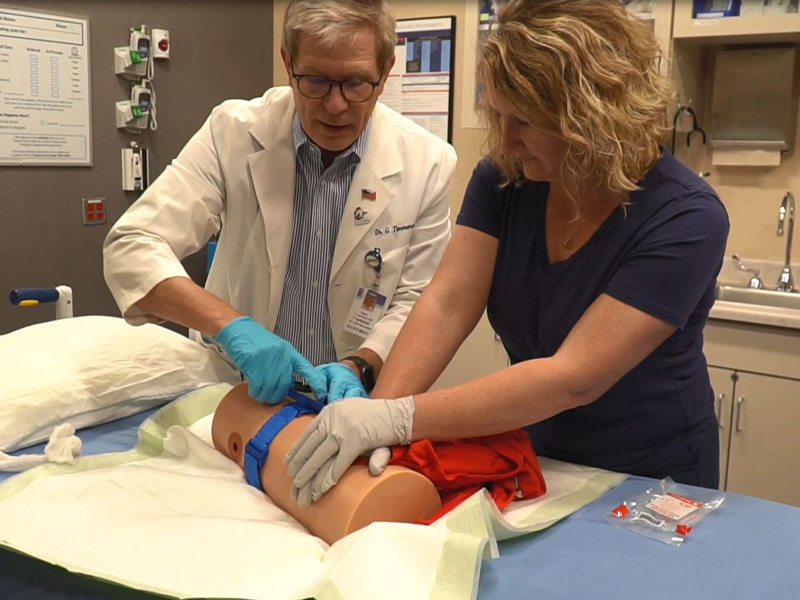Victims of shootings or accidents can quickly die from uncontrolled bleeding — within five to 10 minutes. Learning how to “stop the bleed” can save lives.
In case of an active shooter, explosion, car collision or farming accident causing traumatic bleeding, it’s important to know how to respond. That’s why Sanford Health is offering classes and helping to fund bleeding-control kits.
More than 1 million people around the world have been trained to Stop the Bleed, according to the American College of Surgeons. The life-saving program turns bystanders into immediate responders.
In South Dakota, where Sanford Health is based, all 877 schools have or will receive a minimum of five kits per school through a Stop the Bleed grant. Sanford Health has given more than $20,000 toward the $202,000 program. Kits for South Dakota’s 200 universities are yet to be funded and will come at an additional cost.
Stop the Bleed classes
Surgeons at Sanford Aberdeen Medical Center have taught this class nearly 100 times to people in Eastern South Dakota, including many school staff.
“This training will show you how to act as an immediate responder and save lives,” said Jason Spjut, D.O., a trauma surgeon at Sanford Aberdeen. “Whether an injury is caused by an accident or an active shooter, it’s critical to take action and help stop the bleeding while waiting for first responders. Without assistance, victims can die from uncontrolled bleeding within just a few minutes.”
Stop the Bleed is an initiative of the American College of Surgeons and the Hartford Consensus, to help prepare the public to respond.
“The number one cause of preventable death from trauma is uncontrolled bleeding,” said Amy Hiuser, M.D., a general surgeon at Sanford Aberdeen. “Learning how to control bleeding increases the likelihood that you’ll be able to save yourself or someone else in an emergency. This is important training that I recommend for everyone.”
Speakers at a recent Stop the Bleed class at Sanford Health in Sioux Falls said they’d like to make bleeding-control skills as common as CPR.
Anyone can be a first responder if they learn proper methods to stop bleeding, including how to correctly apply pressure, dress a wound and apply a tourniquet, said Sanford Health surgeon Gary Timmerman, M.D., and injury prevention coordinator Carly Farner-Cordell, MSN, RNBC.
How to Stop the Bleed
First, ensure your own safety. The acronym THREAT is for remembering how to respond to a trauma such as a shooting or intentional mass casualty event:
- T — Threat: Does the threat still exist?
- H — Hemorrhage: Assess the bleeding. Is this something that needs to be addressed immediately?
- RE — Rapid Extrication: Is it safe to get away from the danger?
- A — Assessment: Assess the situation and make sure help is coming along with making sure you have helped control the bleeding.
- T — Transport: Make sure transportation is there or coming to get the victim to the hospital.
Then, stop the bleed using the ABCs of bleeding:
- A — Alert: Call 911 and get some help
- B — Bleeding: Find the bleeding injury
- C — Compress: Apply pressure to stop the bleeding by:
- Covering the wound with a clean cloth and applying pressure by pushing directly on it with both hands, or
- Using a tourniquet, or
- Packing (stuffing) the wound with gauze or a clean cloth and then applying pressure with both hands
What’s in a Stop the Bleed kit
South Dakota Stop the Bleed kits are trauma first aid kits that contain:
- Responder emergency trauma dressing (pressure dressing)
- Gauze, 5”x 9” pad
- Compressed gauze (4.5” 4.1 yd)
- CAT tourniquet
- Nitrile glove, size large
- Trauma shears, 7.25”
- Surgical tape, 2” mini
- Permanent marker
- Bleeding control instruction card
Sanford Health offers Stop the Bleed training by request. To request a training session, call Pam Fiechtner at Sanford Aberdeen Medical Center (605) 626-4219.
Learn more
- Thanks to hands-only CPR, anyone can save a life
- Gun violence drawing attention as a public health crisis
- Minnesota man lucky to be alive after hunting accident
…
Posted In Aberdeen, Allied Health, Emergency Medicine, Health Information, News, Nursing and Nursing Support, Sioux Falls

